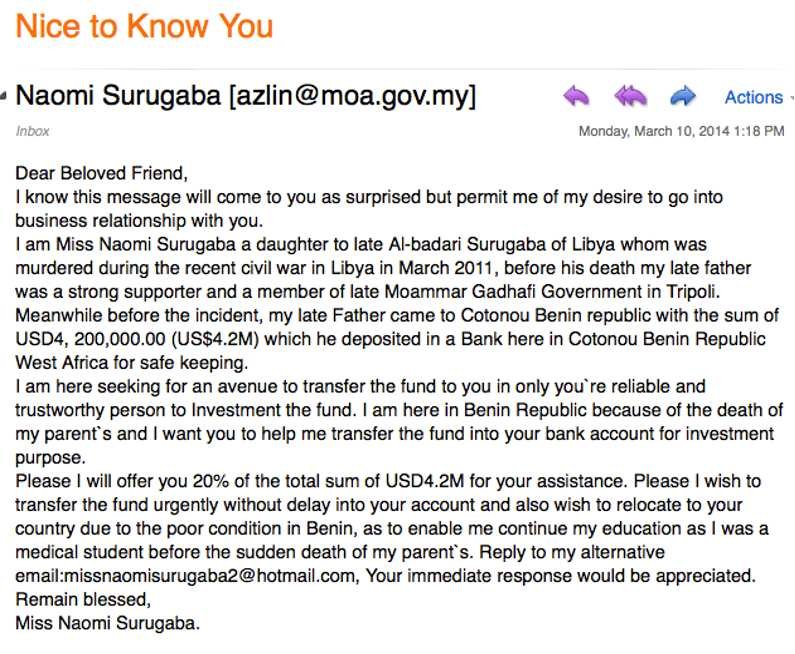Tujuka Lamptey, 32, a single mother of three from Lagos, fell victim to a job scam claiming a guaranteed job in the federal government. The online agent asked her to pay N100,000 as a deposit in return for an N300,000 job in the federal government. Tujuka paid the deposit of N100,000 but after that, she never heard back from the online agent. She later discovered that many other people had also fallen victim to this online job agent.
This is known as a job scam and is on the rise since the Covid-19 pandemic has hit the job market.
Have you ever wondered if a job is real or a scam?
In this article, let’s understand a job scam and how to spot job scams.
Definition
Have you seen those job advertisements that promise you a job immediately with a massive salary? Get your guards up the moment you see something like this. This is a job scam.
Dishonest people, called scammers, entice vulnerable jobseekers to ‘guaranteed high paying jobs if they pay them some money upfront. But after the scammers take money, they disappear. This is a job scam.
As the hard reality is there are millions of Nigerians looking for not-so-many jobs, most people fall prey to these job scams because they are ready to give money to get a job.
Look at this job to know how a fake job email looks.

Short Stories
Abubakar Rilwan, a con man, was arrested by the Nigerian Customs Service (NCS). He had tricked several naïve Nigerian job seekers and obtained as much as N20million from them. In one of his escapades, he collected money from seven job seekers in Taraba State, issued them fake appointment letters, and caused them to travel all the way to Bayelsa State for fake training. Only when they got there, the jobseekers realized there was no job/training for them.
A few weeks back, Jachike had read an overseas job ad for an agriculture supervisor in Spain and immediately applied. Today, he received an email with the final job offer. Salary and perks were much more than what he expected. He was asked to pay an advanced fee of N260,000 for background verification, criminal record check, visa processing, flight booking, etc. Jacke wire transferred the money, but after that, he chased the online job agent on emails but heard back nothing.
In January 2020, fraudsters released false employment letters that were purportedly signed by the Chairman of the Nigerian Communications Commission (NCC).
A few months back in Rivers state, Nigeria, it was gathered that kidnappers had begun to send text messages, inviting their victims for job interviews but they hold them, hostage, as soon as they turn up at the addresses given to them by the abductors and then demand huge sums of money as ransoms from the victim’s family.
Are you a victim of job scams? Let’s examine the real job opportunities in Nigeria and craft an effective CV to get a job in the country with the No.1 Resume Builder in Nigeria at Reventify.
4 Most Common Types of Job Scams in Nigeria:
1. False representation with intend to fraud
A typical Nigerian scam involves an emotional email, letter, text message, or social networking message coming from a scammer (which can be an official government member, a businessman, or a member of a very wealthy family member – usually a woman) who asks you to give help in retrieving a large sum of money from a bank, paying initially small fees for papers and legal matters. In exchange for your help, they promise you a very large sum of money. They will be persistent and ask you to pay more and more money for additional services, such as transactions or transfer costs. You’ll even receive papers that are supposed to make you believe that it’s all for real. In the end, you are left broke and without any of the promised money.

2. Ask for confidential information
Scammers may ask you to provide personal and financial data like bank account details, proof of address, and passport copies. They ask for this information on the pretext of the requirement for eligibility assessment and background check. The scammer may sweep clean your entire bank account.
3. Seek money
They may ask you to pay a fee to get the job. In his interview with The Guardian Nigeria, the President of the Human Capital Providers Association of Nigeria (HuCaPan), Neye Enemigin mentioned a young man who came to his office as head of HR in a well-known company to resume work with a forged employment letter of the company name given to him by one of the scammers. Mr. Enemigin said that scammers extort money from jobseekers promising to secure employment for them. This is very rampant during recruitment by government agencies.
4. Set free from 9-5 jobs and be your own boss
A scammer may lure people with work from home opportunities. The catch? They just need to send a wire transfer or money order upfront to pay for some equipment or educational materials before they can get started, but these never arrive, and there is no actual job.
Another way is a scammer may ask you to invest money to buy goods from them to set up your own business. They will claim that you can earn an enormous amount of money after learning their secret formula but be cautious as they might lure you into something illegal. For example, O’neal Inc claims to be a multifaceted consulting firm with expertise in human resources management, healthcare management, and management. However, they are an MLM and GNLD company out to collect money from you to supply you with health products with a promise of financial reward. But in reality, O’Neal Inc. is a foreign company in construction with an address at https://www.onealinc.com/
Another job scammer goes by the name Starline Consult Nigeria Ltd. It is into multilevel marketing looking for candidates to swindle to sell drugs.
Yes, certain professions like journalists, photographers, writers, translators, or interpreters allow you to be your own boss, but here you have your own skill that you put in to make money.
Ins and outs of a typical scammer
These fraudsters are becoming more and more crafty in the way they operate, and it’s becoming more difficult to differentiate between a scam and a legitimate job vacancy.
Do you suffer from job scams? Let’s examine the real job market in Nigeria and Create an effective CV using the No.1 CV Maker in Nigeria at Reventify.
Here are 16 Telltale Signs That A Job Posting Is Actually A Job Scam:
- You never applied; they just found your resume online and are so impressed with you that they are ready to either interview you or offer you the job right away.
- The pay is unbelievably high. Have you ever heard of something like $45 per hour for a work-from-home with flexible working hours? This kind of money is unusual for admin or any low-skilled work from home job.
- The job description is overtly simple that almost everyone qualifies.
- The emails are full of typos, grammatical mistakes, and poor formatting.
- The email id is generic like Gmail, Yahoo, or Hotmail or email ids are quite close to real companies. For example, the fake recruiter’s email id is MaryJonas@gmail.com. If she is a real recruiter, the email id will be from a business domain like MaryJonas@linkstreet.com or the scammer’s email address is job@synergy-world.com, but the real company email is jobs@synergyworld.com
- An imitation of a similar company such as UnilevR, but the real company is Unilever
- They will conduct the job interview via instant messaging service.
- They do after-hours calls like before 7am and after 9pm
- The scammer’s email has no signature or contact information.
- They ask you to pay for something like buying software, getting training, reviewing your resume, or completing background checks
- They ask you to cash a check or forward some money from your bank account to a third party
- No real website of the hiring company shows up in your search results.
- They have multiple opening all over the internet with the same job description
- They ask you to provide confidential personal information
- They ask you to pay to get a job.
- The scammer shows a sense of urgency. Usually, legitimate companies aren’t blatantly pushy to accept their job offers immediately.
What Are The Job Scammers Looking For?
Scammers are after two things:
- Your money – The scammers ask you to pay for something upfront.
This is a work-from-home job. Work hours are from 10 am-3 pm Monday-Friday and earn $50 per hour. Work more, earn more. Pay $100 to complete the 1-day training and earn certification. Start Job IMMEDIATELY after training.
Human resources reviewed your resume the one you posted on www.topjobs.com. You are quite lucky to get an interview with the hiring manager of our prestigious company. For the interview, you need to buy and download our recruitment software. All correspondence, interviews, and documentation will happen through this software. We need you to send $50 via Western Union for all software costs. Once we receive your payment, we will send the link for the software download to your email id. ACT FAST, YOUR FUTURE IS WAITING!
- Your personal and financial information – The scammers encourage you to provide confidential information, including bank account information. This information is then used to access your bank account and to steal your identity.
We are pleased to inform you of the job you applied for “Mechanical Supervisor, Salary $1850 per month”, you have been appointed after your personal data has been reviewed by the employer. Job stars IMMEDIATELY! Respond to this job offer AS SOON AS POSSIBLE.
- In order to accept this appointment, it is necessary to do the following things:
- Send us the scanned copy of your international passport
- Read and sign the contract form attached to this email and send it back to us via emailtravelagencycentre@international.com or via post. Our office address: First Road, Stelton, Brokeshire, FN2, 1UR, United Kingdom
Below is another job scam ad

How to Tell if a Job is a Scam And Ones That Are Legitimate
Here are 5 things that you must check to differentiate between a legitimate job offer and a fake job offer
1. Strange email id
Emails that are sent from a personal account like Gmail or Yahoo are scams. The savvy scammers may create a fake account that resembles the actual email account of an organization. Carefully read it.
For example, you could receive a job offer from ‘jobs@acenture.com, whereas the actual email account of the organization is ‘jobs@accenture.com’.
2. Unclear job description
Read the job description carefully. Usually, job scams list very generic job requirements like “must be 18 or above, must have access to internet and phone, must have a valid passport, NO EXPERIENCE REQUIRED’.
Take a moment to think about it. For such a job requirement, how many people will qualify? Almost half the world. Isn’t it? Don’t you think why someone will pay so much money for this kind of job?
Another warning sign is that the scammer highlights they will provide on-the-job training, and you only need to accept the offer. No genuine company hires an employee without first checking his or her qualifications.
3. Text in the body of the job offer
Now, genuine companies are very particular about writing professional emails without errors. They consider this a reflection of their employer brand in the job market.
However, a job scam email will be full of punctuation, grammatical, and spelling mistakes. Unnecessarily, words and sentences will be bold-faced, underlined, or italicized to attract attention. For example, IMMEDIATELY, ACT FAST, EARN NOW, NO EXPERIENCE REQUIRED, TRAINING PROVIDED, etc.
Also, it will be an unsigned email. There will be no signature at the bottom of the email with the person’s designation and contact details.
4. Interview process
Job interviews for actual jobs are always conducted professionally. Initial rounds may be done via Google Meet, Skype, or Phone call, but there will be at least one face-to-face round.
If a job offer says an interview will be conducted by ringing a dialing code or through instant messaging apps, be sure it is a scam.
5. No salary breakup was provided
Job scammers provide one attention-grabbing figure as your salary that looks irrational. A job scam will say $XXXXXX is your annual salary. In reality, there is always an HR personnel explaining the salary and its components to the candidate and seeking confirmation on proposed salary acceptance. This is called salary negotiation.
There is never one flat figure as a salary that you take home. A salary always consists of different components like Basic, HRA, Gratuity, Pension/Provident Fund, Allowance, etc. The job offer must provide the details of salary breakup to a new hire.
Take a look at a sample fake job offer:
Greetings,
We saw ur resume online and would like to offer u a job in the company – M&S Associates.
Ur job role and responsibilities will remain the same as stated in your resume. We will give a 60% hike over your current salary, making your total salary package ₦350,000 annually.
You have 2 logs in for only 20 hours every week compared to ur current 40 hours. We will also give you the freedom to work from home.
If you wish to accept the job offer, pls send an email at ‘jobs.sheryl@msassoc.ng’, with information of:
Date birth;
Home address;
National Identity Number (NIN);
Bank account details:
Yours in service,
Sheryl T
M&S Associates
Remember: If it’s good to be true, it might not be true. If it’s too easy, too general, too big, or too fast, it’s a job scam.
Do you suffer from job scams? Let’s examine the real job market in Nigeria and Create an effective CV using the No.1 CV Maker in Nigeria at Reventify.
How To Conduct Proper Research?
You received an email congratulating you on ‘getting the job,’ before you have met the employer – really? Don’t be in a rush to respond. Before you respond to the job offer email, do some in-depth research.
Gather as much information as possible about the company and the people who work there. If a company has no online presence or no named employees, it is a job scam.
In an interview with Money US News.com, Sutton Fell, the CEO and Founder of FlexJobs said, “When you find job listings on outside sites, it’s easy to go to the main career page of the company and check their own website’s listings to see if the job is really being offered by them. If you can’t find it on the company’s career page, it might be a scam.”
Here is what you must check:
- Check the company’s website and its social media presence on LinkedIn, Facebook, and Twitter
- Look up the name of the company or the person who’s hiring you, plus the words “scam,” “review,” or “complaint.” You might find out they’ve scammed other people.
- Check the board line number of the company. Call upon the board line and ask for the recruiter/hiring manager. This confirms the company exists offline; that is, it has an actual setup on the ground.
- What is the name of the hiring manager? Look up the hiring manager’s profile on LinkedIn
- What is the name of the recruiter? Look up the recruiter’s profile on LinkedIn
- Connect with other employees of the company on LinkedIn and ask them about working in the company
- Read reviews about the company on employer review sites like Glassdoor and other online forums
If you feel uncomfortable about something, it is better to speak up. Ask questions to the person talking to you. The scammers will usually disappear when they think you are not taking their bait. But the genuine ones will be patient in answering your queries to your satisfaction.
What To Look For When Deciding On Which Company To Commit To?
Here are the 10 things that you must look for when deciding on which company to commit to:
- The company has a professional website with no language and grammatical errors
- The company has a LinkedIn profile with visible profiles of employees and their designations
- There are positive reviews from current and past employees on employee review sites like Glassdoor
- You had applied for the said job role before you heard from them.
- You go through a proper interview process with at least one round face-to-face with the hiring manager.
- There are profiles of recruiter, hiring manager, and other company employees on LinkedIn.
- The company doesn’t ask you to pay money to get the job or any sort of training and software.
- The company doesn’t ask you for any sensitive information unless the interview process is complete, salary negotiations are done, and you’ve accepted the job offer (still, credit card details and passwords are a big red flag)
- The job offer provides proper details of the job description, salary break-up, reporting manager title, and designation.
- The stated salary matches the experience and qualifications required for the job role.
Conclusion
Job scams are a big concern. Almost 80% of jobs in Nigeria are scams. Scammers feed on the fear and insecurity of the jobseekers. They promise large salaries in return for your money and personal information.
If you think a job offer looks too good to be true, then it probably is.
Remember: all that glitters is not gold. All job offers aren’t ‘real’ jobs.
Even though you are desperate for a job, be smart and stay alert not to fall for a job scam!
If you want to avoid job scams in Nigeria and find a real opportunity, let’s explore some top job sites in Nigeria and build an impressive cv with a professional cv builder at Reventify to increase the chances of getting a job.




